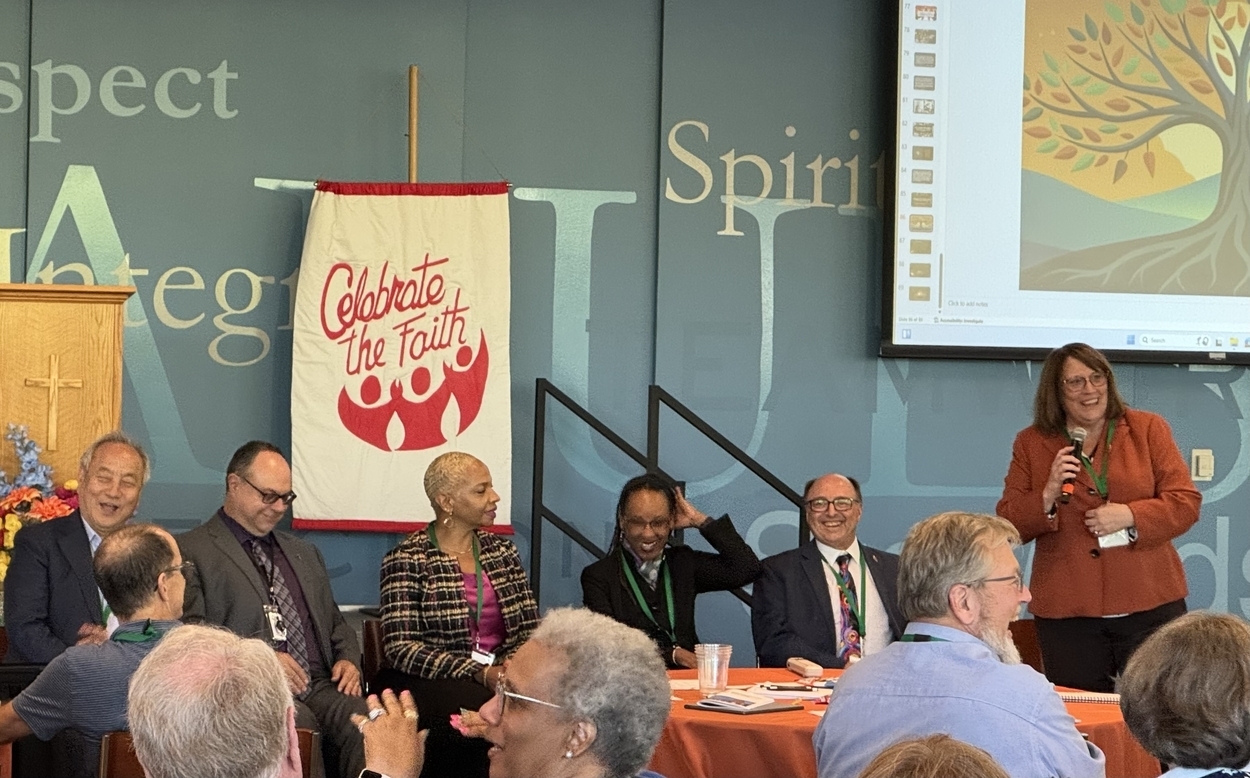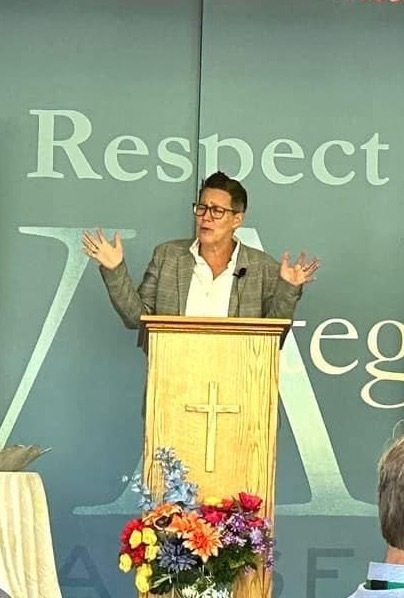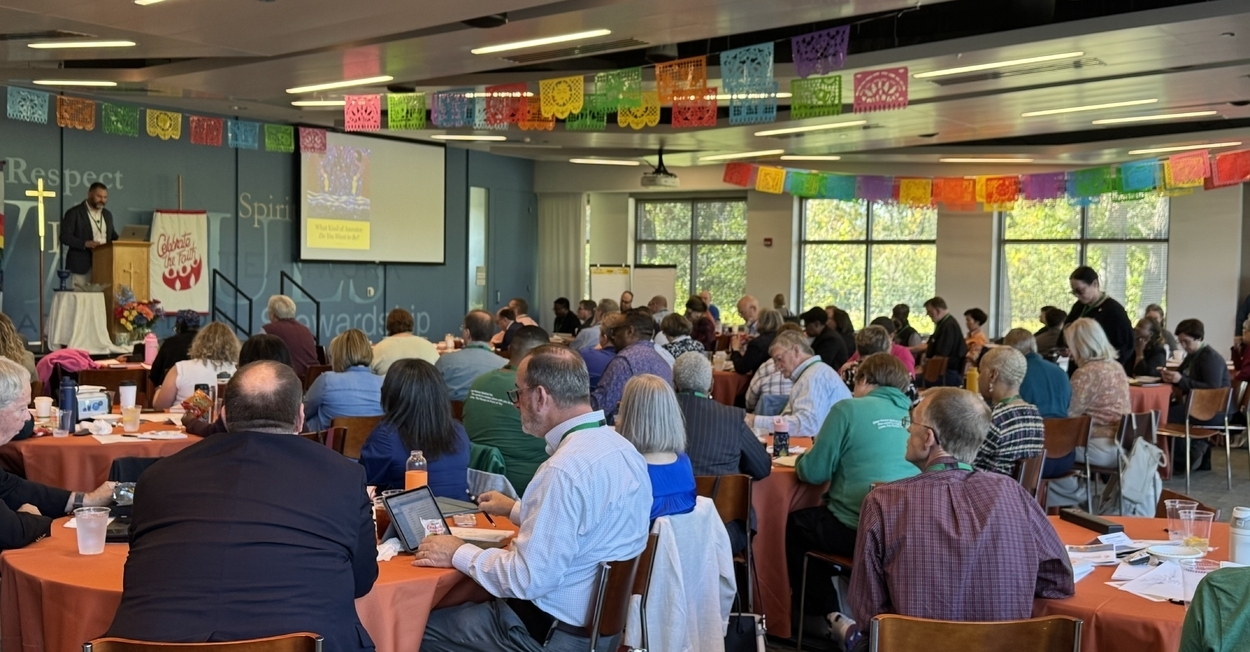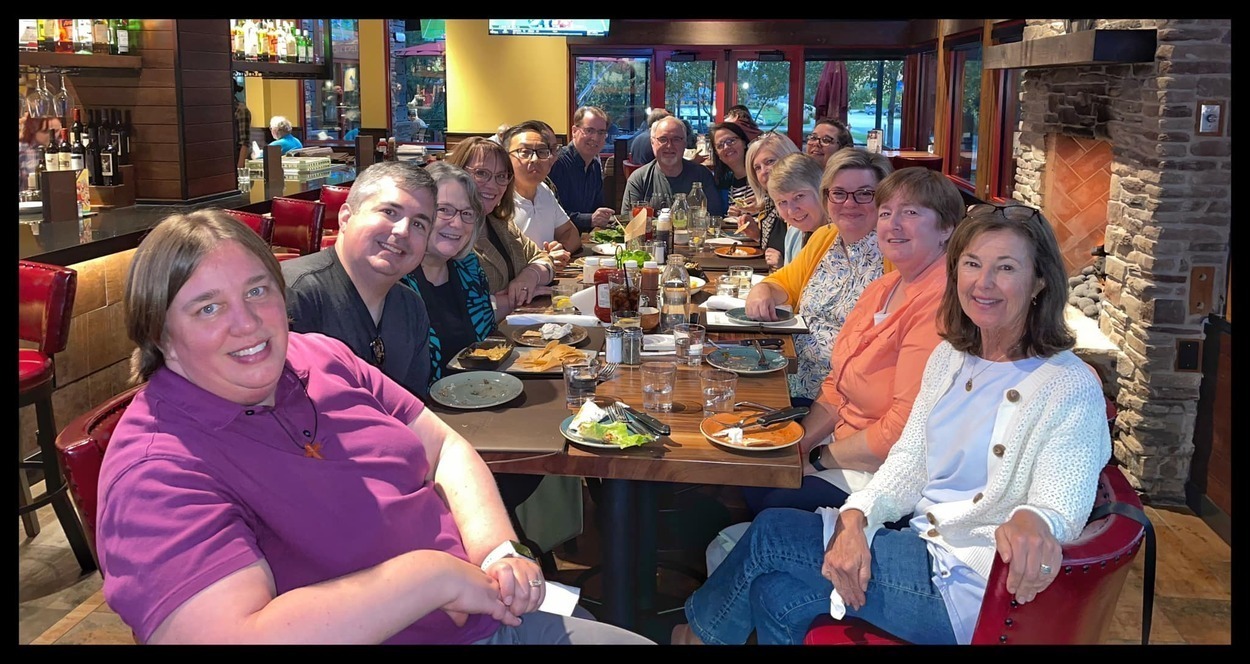
Leadership gathering fuels connection and collaboration

The active bishops of the NCJ shared their reflections and hopes for the future of the UMC.
Last week, the North Central Jurisdiction of The United Methodist Church gathered key strategic leaders and active bishops in Chicago for an enriching time of fellowship, learning, and discernment.
"The purpose of this meeting was to collectively explore the opportunities and challenges that lie ahead for our church as we continue to live into our call to make disciples of Jesus Christ for the transformation of the world," explained Bishop Lanette Plambeck, resident bishop of the Dakotas-Minnesota area.
District superintendents, assistants to the bishop, connectional ministry directors, and leaders in areas such as strategy and innovation, clergy care and leadership development, and racial justice and equity were invited to attend the event. The gathering featured TED-talk-style sessions led by faculty from Garrett-Evangelical Theological Seminary, as well as time for networking, idea sharing, and small group reflection on mission and ministry.
"We are a connected church, and it was such a blessing to get to know and work with people in our same roles in other annual conferences," said Rev. Kris Mutzenberger, district superintendent from the Dakotas Conference. "We are better together and can learn from one another."
“Having the chance to collaborate with other church planters and developers was great,” described Rev. Erica Koser, interim strategy and innovation cultivator for the Minnesota Annual Conference. “There are many shared resources and best practices that we can learn from each other that will benefit the whole.”
Through plenary sessions and deep conversations, attendees focused on discipleship in the Wesleyan tradition and critical topics such as white Christian nationalism, environmental care, and strategic leadership in the evolving landscape of our communities and the church. The insightful contributions from the Garrett faculty equipped the leaders with theological and practical frameworks to lead with grace, wisdom, and courage in these times.
"The way that all of the presenters linked our mission – Making disciples for the transformation of the world – with the important topics of soul care, antiracism, and creation care brought a sense of urgency and aligned purpose to me," said Jody Thone, director of ministry development for the Minnesota Annual Conference.

Rev. Dr. Jennifer Harvey shares insights into the challenging work of daily antiracism.
Rev. Dr. Jennifer Harvey, vice president of academic affairs/academic dean and professor of Christian ethics, led the group in wrestling with what it means to be "Called to Daily Antiracism: Being the Church in a White Nationalist Storm."
She described racism as "a system of advantage or disadvantage, based on race" and framed the call to antiracism work as one of becoming a good ancestor. This work involves wrestling with the challenging realities of our history, including the ways repeated compromise in racial justice in the Church has socialized white Christians.
"Our ancestors didn't pass down what it means to be a good member of a multi-racial society," she humbly explained.
Even as she offered words of reality and challenge to the group of leaders, Dr. Harvey also invited and encouraged them to "teach, preach, and organize that racism is a behavior." She invited people to see the redemptive possibilities in every beloved child of God and acknowledged that behaviors are chosen and can be changed.
"I believe too often when we point the finger at someone and name them as 'racist,' it throws up a wall to any possibility of transformation in us, them, or our relationship," said Rev. Becky Jo Messenbrink, district superintendent from the Minnesota Annual Conference. "When one can recognize a particular behavior as racism, they can then choose to act in a different way, and the transforming work of Christ becomes possible!"
Dr. Harvey also named the reality of grief in antiracism work and the importance of helping people deal with the grief they might experience as they acknowledge that we can't go back to the past. This grief work becomes a means of helping people experience transformation and new life.
Referencing the Gospel stories of Easter morning, she pointed out, "The women were the first to experience resurrection because they went to the tomb—they faced grief."

Rev. Dr. Tim Eberhart, Dakotas Conference elder, was one of the speakers at a recent gathering of leaders from across the North Central Jurisdiction of the UMC.
Dr. Harvey was joined by Rev. Dr. Tim Eberhart, a Dakotas Conference elder who resides in the Twin Cities and is an Associate Professor of Ecological Theology and Practice and Director of the Center for Ecological Regeneration for Garrett.
Dr. Eberhart began his two-part talk, "Roots and Reach: A Living Tradition for Today and Regenerative Mission in a Climate Changed World," by providing a refresher on the foundations of Wesleyan-Methodist discipleship—Following Jesus, Plain Truth for Plain People, Social Holiness, Radical Equality for All, and God is Love.
This scaffolding provided the framework for the second portion of his teaching, which focused on creation care. Walking through the first chapter of the Genesis creation story in reverse, Dr. Eberhart described how humans are "un-creating" in the way we over-use and abuse the earth's resources.
One parallel that Dr. Eberhart pointed out in his reverse creation story analogy was that of the Sabbath. "Then God blessed the seventh day and made it holy because on it he rested from all the work of creating that he had done" (Genesis 2:3 NIV). He described the ways in which we have not followed this commandment and allowed the environment to rest, instead choosing to overuse its resources in much the same way that we, as a culture, have neglected Sabbath rest and find ourselves depleted.
He, too, acknowledged that facing the honest realities of what we have done and are doing—or not doing—as stewards of God's creation can bring with it a mix of emotions.
"Only as we walk people through the emotions of lament, grief, and shame can we marshal the resources to make the necessary changes," explained Dr. Eberhart.
As with the work of antiracism, Dr. Eberhart framed the need for faithful, urgent responses being motivated by our love for those who will come after us.
"For me, that question about being a good ancestor is much deeper than solely a response to creation care," reflected Rev. Dan Bader, Dakotas Conference district superintendent. "It is also a response to all that is going on in the world and that we talked about - racism, holistic health of our clergy and laity, etc."
Rev. Dr. AHyun Lee, Associate Professor of Pastoral Theology, Care, and Psychotherapy and Director of the MAPCC Program at Garrett, rounded off the learning time. Dr. Lee provided exercises in soul care, a vital element for leaders in our time.
This need for soul care for leaders in our denomination and attending to all areas of well-being was echoed in a presentation by the staff of Wespath, the benefits and investments provider for The United Methodist Church. Their presentation included some sobering statistics.
"Seeing Wespath's data on more than 75% of clergy having PTSD-like symptoms was a startling reminder that we must continue to care for ourselves and each other," said Rev. Brandon Vetter, district superintendent in the Dakotas Conference.

Leaders from the Dakotas-Minnesota Area gathered for dinner to begin the time of learning and connection.
“I realized our Area has made significant progress in ways that other annual conferences have not,” shared Diane Owen, area director of clergy well-being. “Just the way we work together as an Area – blending the unique strengths of each annual conference – demonstrates we can be better together.”
“I am hopeful the shared learning and collaboration – both within our Area and the NCJ - will continue and further strengthen the UMC and our collective mission. While we have differences among our annual conferences - in populations, systems, culture - these differences ultimately make us stronger.”
As spiritual and temporal leaders in our denomination, the six active bishops from the jurisdiction also provided important leadership to this event through times of worship, words of challenge and encouragement, and strategic conversations in small group times and panel discussions.
"We remain committed to fostering environments where God's love is known in every corner of our communities and where justice, equity, and care for creation guide our ministry," emphasized Bishop Lanette. "This gathering was a significant step toward deepening collaboration across our jurisdiction as we seek to shape the future of The United Methodist Church with hope and faithfulness."